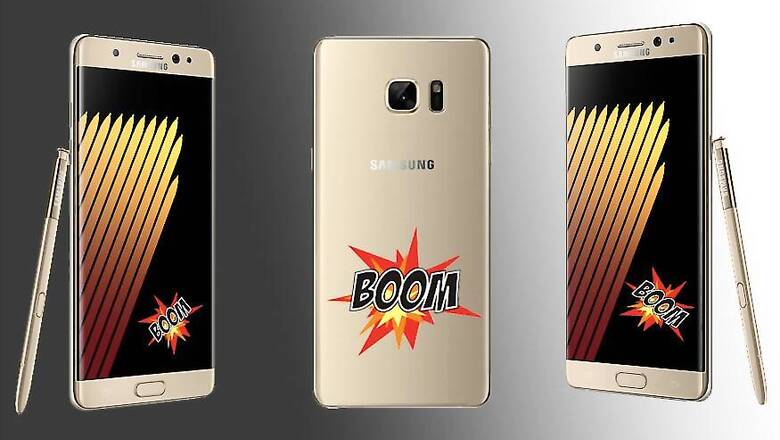
views
The timing just couldn't be worse for Samsung. With the dark clouds of “exploding phones" controversy looming large over its flagship product Galaxy Note 7, it seems the smartphone major has hit a “bendgate" of its own making.
In the meantime, Apple has launched its much-awaited iPhone 7 and 7 Plus. The two tech giants are venerated as David and Goliath of the industry when it comes to innovation on smartphones. Products awaited eagerly every year are the Samsung Notes and iPhones.
In the early 1900s, when the four-wheeled car took to the horse-carriage roads, every futurist predicted that in the 21st century it would fly. It’s 2016 and we are yet to see a commercially-available flying car. It still has the basic blueprint of a cabin, four wheels and an engine.
Something similar happened in the world of smartphones. When the first iPhone was launched in 2007, it revolutionised the smartphone industry. With its innovative touch display and web-browsing capabilities coupled with a camera, the future of smartphones looked promising. Many believed, in 10 years times the smartphones would evolve into smaller and more powerful devices. What’s more, it was debated whether the physical display would be replaced by hologram and projections.
Come 2016 and the displays have gone bigger and the smartphone still consists of its basic components. Each smartphone retains its basic display, a processor, a battery and a camera. So what exactly do users expect from these smartphone companies?
Efforts are on to make phones faster, cameras better, batteries last longer and though a 2-GB RAM might work as efficiently, 6 GB RAM are currently on offer. Virtual Reality (VR) and Internet of Things (IoT) are the next stops. So, when the specification war started among companies, only these basic components were played with and enhancements made to.
However, it seems a stroke of bad luck or just negligence on the part of the product team led to the “exploding" battery issue in Galaxy Note 7. The situation became worse with governments and airlines advising against carrying the device onboard an aircraft. Lithium batteries are known to be volatile and the new high-density batteries is still an improving technology.
Meanwhile, Samsung has gone into a damage-control mode, advising users to stop using the Galaxy Note 7 and exchange them as soon as possible.
With processing speeds doubling every year, more transistors are packed into a micro-chip. For instance, when you check your Facebook, these transistors vibrate to communicate with each other and try to give you a seamless experience. In turn, they generate heat while communicating. In 2013, a heated phone was hardly heard of. In 2016, a small area of real estate are packing in more occupants and there is no breathing space left.
Companies have now started justifying this phenomenon as “mildly warm" and attributing it to the processing power. It is likely that the case of Samsung Galaxy Note 7 exploding could be due to faulty battery made of volatile material and the heat from its super-powerful processor pushing it off the edge.
However, the real reason that Samsung is in a fix is not just because they goofed up, it's also because of the consumer demand. Now, every new iteration is expected to be radical and judged based on what more it packs in. It's the consumer demand for more that's fueled companies to increase their launch cycles to two flagship phones a year – in some cases even five.
So before you blame Samsung for creating an “unsafe" device, question yourself first. Do you really need all that extra processing speed and a high-density, long-running battery just to check your Facebook and Tweet? Apple has judiciously stayed away from the specification game, using low-powered processors and still offering a seamless user experience.
Now, with airlines banning the Note 7 and Samsung shares dipping, seven is definitely not a lucky number for the tech giant. And 2016 may prove to be a year of learning for the company.



















Comments
0 comment